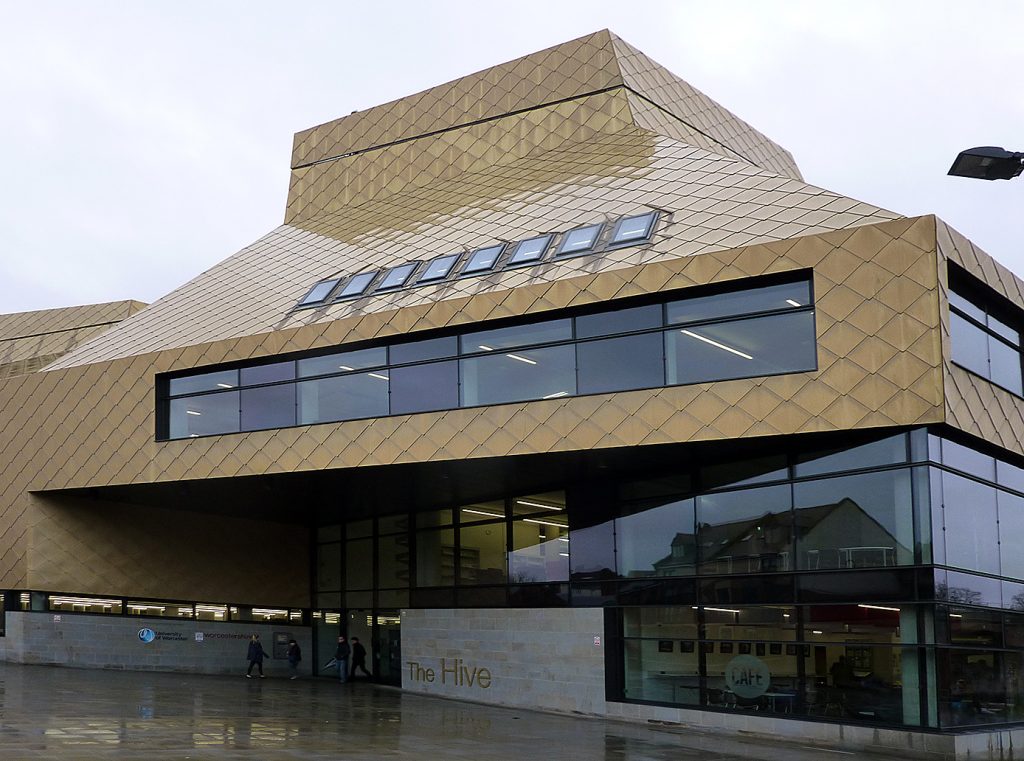As a regional hub for the UOSH project the team at the University of Leicester has worked with collections from institutions across the Midlands. This series of blog posts by Elizabeth Gray will explore the collection holders that we have worked with, and showcase some of the many highlights we have discovered in their collections.
First up is Worcestershire Archive and Archaeology Service based at The Hive, a purpose-build building in Worcester opened in 2012, which also houses the city library. The Service provides assistance on both a public and professional level, and offers access to a wealth of material on the history and archaeology of the county. It is responsible for preserving over 12 miles of original archives, including sound recordings.

One of the most interesting collections the Midlands team worked on was the World War Two collection. This series of oral history interviews, recorded by Record Office staff between the 1990s and 2000s, tells the story of the war from the perspective of both soldiers and civilians. From the accounts of Prisoners of War (POWs) to the role women played in communications security, the collection covers a wide variety of topics to enable listeners to develop a comprehensive understanding of the impact of World War Two. The recordings also emphasise the global scope of the war by discussing events, not only across Europe, but also in North Africa and the Middle East. The information and anecdotes from both the Home Front and War Front that this collection provides makes it fruitful listening for anyone with an interest in the period.
Another highlight is the Worcestershire Life Stories collection. Like the World War Two collection, these recordings were made by the Record Office, and they cover a wide variety of personal experiences. This collection provides lots of information about everyday life in Worcestershire, including details of schooling, work, and leisure in the locality. The recordings offer an insight into how the county has changed over the decades, and is a really useful resource for understanding the 20th century history of Worcestershire on a more personal level. It also includes many entertaining anecdotes such as the one below, where the interviewee recalls his unusual role as ‘Mayor Consort’.
The other collections from Worcestershire Archive and Archaeology Service that the Midlands hub worked with were:
- 1969 Conference of the Society of Archivists – recordings gathered by the councils of Worcester and Worcestershire form a variety of sources to form an ‘artificial collection’ covering topics such as accents and dialects, archivist procedures, and civil events
- Fred Archer Recording – recording of local farmer and author made to record the local dialect
- Ivy Palmer Recording – recording of the Worcester city accent
- Last Assize Sitting in Worcester – recording of the last assize sitting of the Oxford Circuit as Worcester
- New County Headquarters – recording of conversations regarding the requirements for a Record Office in the new county headquarters
- Three Choirs Festival 1969 – recording made of the Choir Festival at Worcester Cathedral
- Redhill School Project – recordings of interviews with former pupils and employees of Redhill School conducted by pupils in 2006, and by Worcestershire Record Office staff in later years
- Record Office Training Tapes – recordings made by the County Archivist for the purpose of providing staff training materials, probably 1960s/1970s
- Worcester City Archive Project – recordings of oral history interviews focusing on memories of the St Johns area of Worcester and Cripplegate Park, produced as part of the Worcester City Source Project
- Record Office Oral History Competition – recordings of interviews of relatives and friends, made by schoolchildren for the Oral history Competition organised by Worcestershire Record Office in 2003
- Diamond Ring Gipsy Ensemble – recording of a musical performance by the ensemble
This blog post has only given a brief glimpse of the sound material held by Worcestershire Archive and Archaeology Service. If you are interested in finding out more about the service, and the material it holds, visit the Explore the Past website. You can also use the British Library SAMI catalogue to explore the sound collections.
Blog written by Elizabeth Gray.


 Subscribe to Colin Hyde's posts
Subscribe to Colin Hyde's posts
Recent Comments